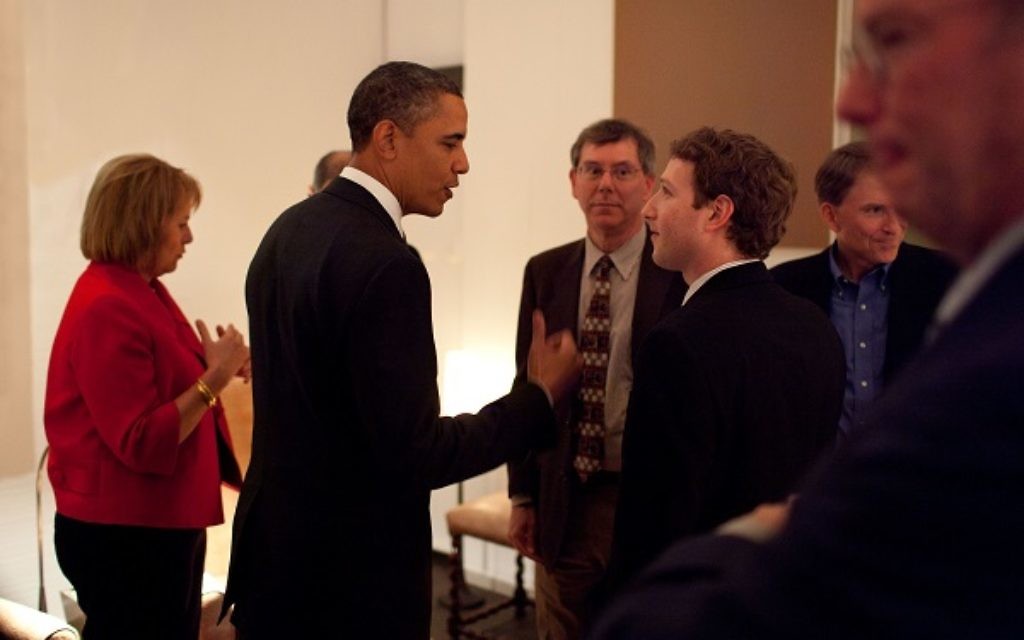Zuckerberg tells Obama of ‘frustration’ over government spying

Facebook supremo Mark Zuckerberg has called president Barack Obama to express his frustration over what he says is long-lasting damage caused by the US government’s surveillance programmes.
Posting on his Facebook page, Mr Zuckerberg wrote that he is “confused and frustrated by the repeated reports of the behaviour of the US government. When our engineers work tirelessly to improve security, we imagine we’re protecting you against criminals, not our own government”.
Though Mr Zuckerberg does not name the National Security Agency, the post came a day after news site Intercept reported that the National Security Agency has impersonated a Facebook server to infect surveillance targets’ computers and get files from a hard drive. The report is based on documents leaked by former NSA contractor Edward Snowden.
Get The Jewish News Daily Edition by email and never miss our top stories Free Sign Up
The NSA called the report “inaccurate”, adding in a statement: “NSA uses its technical capabilities only to support lawful and appropriate foreign intelligence operations, all of which must be carried out in strict accordance with its authorities.”
White House spokeswoman Caitlin Hayden confirmed that the president spoke with Mr Zuckerberg regarding “recent reports in the press about alleged activities by the US intelligence community”.
Technology companies including Facebook, Google and Microsoft have been increasingly vocal about frustrations over the US government’s spying programmes. Last month, top executives from the companies, along with others from Yahoo, Twitter, AOL and LinkedIn, called for changes that would include a government agreement not to collect bulk data from internet communications.
The ongoing strife over surveillance could threaten what has been a cordial relationship between Silicon Valley and the president. The region has voted overwhelmingly for Mr Obama in both of the past two presidential elections. Nearly 70% of Santa Clara County, which is home to Facebook, Google, Yahoo and a slew of other tech giants, sided with the president in the 2012 elections.

In his post, Mr Zuckerberg called on the government to be more transparent, but added that, unfortunately, “it seems like it will take a very long time for true full reform”.
In January, Mr Obama ordered a series of changes to mass surveillance programmes that included ending the government’s control of phone data from hundreds of millions of Americans and ordered intelligence agencies to get a court’s permission before accessing such records.
Tech companies took the president’s speech as a step in the right direction, but said more is needed to protect people’s privacy – along with the economic interests of US companies that generate most of their revenue overseas.
US internet companies are worried that people, especially those living overseas, will not trust them with personal information if they believe such data is being collected by the US government.
“The US government should be the champion for the internet, not a threat. They need to be much more transparent about what they’re doing, or otherwise people will believe the worst,” Mr Zuckerberg wrote.

Thank you for helping to make Jewish News the leading source of news and opinion for the UK Jewish community. Today we're asking for your invaluable help to continue putting our community first in everything we do.
For as little as £5 a month you can help sustain the vital work we do in celebrating and standing up for Jewish life in Britain.
Jewish News holds our community together and keeps us connected. Like a synagogue, it’s where people turn to feel part of something bigger. It also proudly shows the rest of Britain the vibrancy and rich culture of modern Jewish life.
You can make a quick and easy one-off or monthly contribution of £5, £10, £20 or any other sum you’re comfortable with.
100% of your donation will help us continue celebrating our community, in all its dynamic diversity...
Engaging
Being a community platform means so much more than producing a newspaper and website. One of our proudest roles is media partnering with our invaluable charities to amplify the outstanding work they do to help us all.
Celebrating
There’s no shortage of oys in the world but Jewish News takes every opportunity to celebrate the joys too, through projects like Night of Heroes, 40 Under 40 and other compelling countdowns that make the community kvell with pride.
Pioneering
In the first collaboration between media outlets from different faiths, Jewish News worked with British Muslim TV and Church Times to produce a list of young activists leading the way on interfaith understanding.
Campaigning
Royal Mail issued a stamp honouring Holocaust hero Sir Nicholas Winton after a Jewish News campaign attracted more than 100,000 backers. Jewish Newsalso produces special editions of the paper highlighting pressing issues including mental health and Holocaust remembrance.
Easy access
In an age when news is readily accessible, Jewish News provides high-quality content free online and offline, removing any financial barriers to connecting people.
Voice of our community to wider society
The Jewish News team regularly appears on TV, radio and on the pages of the national press to comment on stories about the Jewish community. Easy access to the paper on the streets of London also means Jewish News provides an invaluable window into the community for the country at large.
We hope you agree all this is worth preserving.
-
By Brigit Grant
-
By Laurent Vaughan - Senior Associate (Bishop & Sewell Solicitors)
-
By Laurent Vaughan - Senior Associate (Bishop & Sewell Solicitors)
-
By Laurent Vaughan - Senior Associate (Bishop & Sewell Solicitors)
-
By Laurent Vaughan - Senior Associate (Bishop & Sewell Solicitors)





















